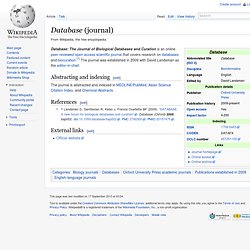 Database: The Journal of Biological Databases and Curation is an online peer-reviewed open access scientific journal that covers research on databases and biocuration.[1] The journal was established in 2009 with David Landsman as the editor-in-chief. The journal is abstracted and indexed in MEDLINE/PubMed, Asian Science Citation Index, and Chemical Abstracts. Official website
Database: The Journal of Biological Databases and Curation is an online peer-reviewed open access scientific journal that covers research on databases and biocuration.[1] The journal was established in 2009 with David Landsman as the editor-in-chief. The journal is abstracted and indexed in MEDLINE/PubMed, Asian Science Citation Index, and Chemical Abstracts. Official website
Database (Journal)
Collected Advice on Research and Writing
Publications Pzreworski, Adam and Salomon, Frank Writing proposals for research funding is a peculiar facet of North American academic culture, and as with all things cultural, its attributes rise only partly into public consciousness. Capture the reviewer's attention Aim for clarity Establish the context What's the pay-off?
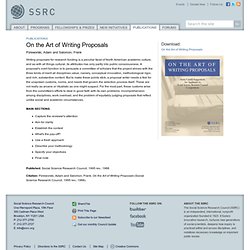
The Art of Writing Proposals — Publication
Choosing & Using Sources: A Guide to Academic Research | Open Textbook
login Choosing & Using Sources: A Guide to Academic Research Teaching & Learning, Ohio State University Libraries Choosing & Using Sources presents a process for academic research and writing, from formulating your research question to selecting good information and using it effectively in your research assignments. ❱❱❱ View additional formats of this book.❱❱❱ Read Book Description Chapters cover developing research questions, understanding types of sources, searching for information, evaluating sources, and avoiding plagiarism. What experts are saying about Choosing & Using Sources: A Guide to Academic Research: “…a really fantastic contribution that offers a much needed broadened perspective on the process of research, and is packed to the brim with all kinds of resources and advice on how to effectively use them.” – Chris Manion, PhDCoordinator of Writing Across the Curriculum at Ohio State University – J. Table of Contents Pressbooks.com: Simple Book Production
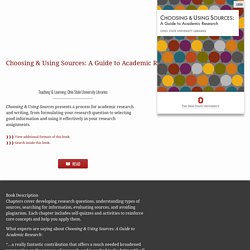
Introduction to Research | Cornell University Library
Research needs and requirements vary with each assignment, project or paper. Although there is no single "right" way to conduct research, certain methods and skills can make your research efforts more efficient and effective. If you have questions or can't find what you need, ask a librarian. Choosing and developing a research topic Suggestions for finding a topic Discuss your ideas with your course instructor. Identifying a topic State your topic idea as a question. Identify the main concepts or keywords in your question. Testing the topic Before you commit to a specific topic for your research, do a scan to make sure that your topic isn't completely covered in another paper; at the same time ensure that there is enough information available to complete the project. If you are finding too much information and too many sources, narrow your topic. Finding too little information may indicate that you need to broaden your topic by using a more general term or terms in your search. The Get it!
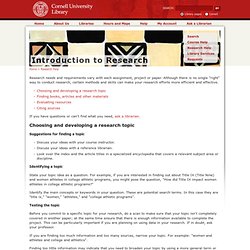
Positivism is the philosophy of science that information derived from logical and mathematical treatments and reports of sensory experience is the exclusive source of all authoritative knowledge,[1] and that there is valid knowledge (truth) only in this derived knowledge.[2] Verified data received from the senses are known as empirical evidence.[1] Positivism holds that society, like the physical world, operates according to general laws. Introspective and intuitive knowledge is rejected, as is metaphysics and theology. Although the positivist approach has been a recurrent theme in the history of western thought,[3] the modern sense of the approach was developed by the philosopher Auguste Comte in the early 19th century.[4] Comte argued that, much as the physical world operates according to gravity and other absolute laws, so does society.[5] Etymology[edit] Overview[edit] Antecedents[edit] Auguste Comte[edit] Antipositivism[edit] Main article: antipositivism In historiography[edit]
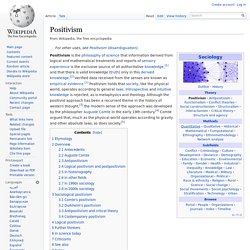
Positivism
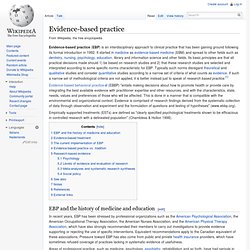 Evidence-based practice (EBP) is an interdisciplinary approach to clinical practice that has been gaining ground following its formal introduction in 1992. It started in medicine as evidence-based medicine (EBM) and spread to other fields such as dentistry, nursing, psychology, education, library and information science and other fields. Its basic principles are that all practical decisions made should 1) be based on research studies and 2) that these research studies are selected and interpreted according to some specific norms characteristic for EBP. Evidence-based behavioral practice (EBBP) "entails making decisions about how to promote health or provide care by integrating the best available evidence with practitioner expertise and other resources, and with the characteristics, state, needs, values and preferences of those who will be affected. EBP and the history of medicine and education[edit] Evidence-based treatment[edit] The current implementation of EBP[edit] Psychology[edit]
Evidence-based practice (EBP) is an interdisciplinary approach to clinical practice that has been gaining ground following its formal introduction in 1992. It started in medicine as evidence-based medicine (EBM) and spread to other fields such as dentistry, nursing, psychology, education, library and information science and other fields. Its basic principles are that all practical decisions made should 1) be based on research studies and 2) that these research studies are selected and interpreted according to some specific norms characteristic for EBP. Evidence-based behavioral practice (EBBP) "entails making decisions about how to promote health or provide care by integrating the best available evidence with practitioner expertise and other resources, and with the characteristics, state, needs, values and preferences of those who will be affected. EBP and the history of medicine and education[edit] Evidence-based treatment[edit] The current implementation of EBP[edit] Psychology[edit]
Evidence-based practice
ABI research - Technology Market Research
National Institute of Standars and Technology (Journal of Research)
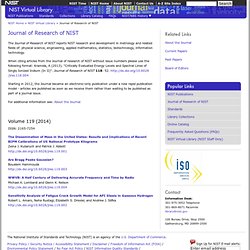 The Journal of Research of NIST reports NIST research and development in metrology and related fields of: physical science, engineering, applied mathematics, statistics, biotechnology, information technology. When citing articles from the Journal of research of NIST without issue numbers please use the following format: Kramida, A (2013). "Critically Evaluated Energy Levels and Spectral Lines of Singly Ionized Indium (In II)". Starting in 2012, the Journal became an electronic-only publication under a new rapid publication model - articles are published as soon as we receive them rather than waiting to be published as part of a journal issue. For additional information see: About the Journal The Dissemination of Mass in the United States: Results and Implications of Recent BIPM Calibrations of US National Prototype KilogramsZeina J. Are Bragg Peaks Gaussian? WWVB: A Half Century of Delivering Accurate Frequency and Time by RadioMichael A.
The Journal of Research of NIST reports NIST research and development in metrology and related fields of: physical science, engineering, applied mathematics, statistics, biotechnology, information technology. When citing articles from the Journal of research of NIST without issue numbers please use the following format: Kramida, A (2013). "Critically Evaluated Energy Levels and Spectral Lines of Singly Ionized Indium (In II)". Starting in 2012, the Journal became an electronic-only publication under a new rapid publication model - articles are published as soon as we receive them rather than waiting to be published as part of a journal issue. For additional information see: About the Journal The Dissemination of Mass in the United States: Results and Implications of Recent BIPM Calibrations of US National Prototype KilogramsZeina J. Are Bragg Peaks Gaussian? WWVB: A Half Century of Delivering Accurate Frequency and Time by RadioMichael A.
Media Research Center (Reality Checks)
 MRC Study: Network TV Buries ObamaCare’s Bad News So far this year, the three network evening newscasts have minimized, spun or ignored every negative development about ObamaCare, while at the same time touting staged pro-ObamaCare publicity ... The Media's Most Outrageous Olympic Outbursts Sports fans checking in on coverage of Team USA at the 2014 Winter Olympics in Sochi, Russia might want to brace themselves for unexpected outbursts of liberal preaching from reporters covering ... Date Filter Filter Media Reality Check by Date Range
MRC Study: Network TV Buries ObamaCare’s Bad News So far this year, the three network evening newscasts have minimized, spun or ignored every negative development about ObamaCare, while at the same time touting staged pro-ObamaCare publicity ... The Media's Most Outrageous Olympic Outbursts Sports fans checking in on coverage of Team USA at the 2014 Winter Olympics in Sochi, Russia might want to brace themselves for unexpected outbursts of liberal preaching from reporters covering ... Date Filter Filter Media Reality Check by Date Range
Media Research Center (Press Releases)
 Bozell Blasts CPAC Over Invitation to American Atheists Statement from Media Research Center President Brent Bozell: “The invitations extended by the ACU, Al Cardenas and CPAC to American Atheists to have a booth is more than an attack on conservative ... NBC Buries Own Reporter To Hide Obama Lie In a bombshell report for NBC News.com, NBC News senior investigative correspondent Lisa Myers found buried in the 2010 Obamacare regulations language predicting, “A reasonable range for the ... Date Filter Filter Press Releases by Date Range
Bozell Blasts CPAC Over Invitation to American Atheists Statement from Media Research Center President Brent Bozell: “The invitations extended by the ACU, Al Cardenas and CPAC to American Atheists to have a booth is more than an attack on conservative ... NBC Buries Own Reporter To Hide Obama Lie In a bombshell report for NBC News.com, NBC News senior investigative correspondent Lisa Myers found buried in the 2010 Obamacare regulations language predicting, “A reasonable range for the ... Date Filter Filter Press Releases by Date Range
Capital Research Center (Blog)
National Institute of Standars and Technology (Journal of Research)
S&P Credit Research RSS Research Feed - Subscribe Today - AlacraStore.com
homunculus
Plumber Raleigh - Weather Master's Mr. Plumber - North Carolina
Did you kitchen sink just back up or your water heater finally breakdown? Weather Master’s Mr. Plumber offers you courteous, experienced, licensed by the State of North Carolina, trust certified plumbers. We’ll arrive on-time, in a clean uniform and clean up before we leave. We can repair, maintain or improve your plumbing system and our plumbing service includes a 100% money back guarantee, along with customer care policies that are unmatched in the industry! Weather Master’s Mr. You approve the price Before We Start Drop cloths used on every job Plumbers wear shoe covers while in your home We clean up after ourselves before we leave Quality workmanship at a Fair Price Licensed, Trust Certified Technicians Member of the Better Business Bureau 100% Satisfaction Guarantee For all of your home’s plumbing needs... don't hesitate to give us a call! Let Weather Master’s Mr. For more on plumbing or any of our other products and services, please Schedule Service today.

Research Resources For Writers
Research Resources For Writers
Social Research Methods
How about some research data to test some of the theories that you have come across or ideas inspired by your cyberspace perusals? Click here for a collection of data and information resource sites (including some useful tools, such as an historical cost-of-living calculator). Be sure to check out and take advantage of the Federal Government resources. Within the topic-based pages at this site you will find considerable use of the General Social Surveys (GSS) of the National Opinion Research Center (NORC). If you should use any of the analyses of the GSS on these pages, the following citation is recommended: Davis, James Allan and Smith, Tom W. If you enjoyed working with the GSS how about getting into cross-national surveys? Courtesy of Jim Spickard, you can now obtain both data sets and analytic software at his Download Statistical Software site. For strategies for data collection see Bill Trochim's Research Methods Tutorials, including material on: W.L. Let's get graphical
A Sociological Tour Through Cyberspace: Data Resources, Research Methods, and Research Statistics
James Rhodes, School of Social Sciences The essence of the method Ethnography is essentially about embedding ourselves as researchers within specific social settings for a prolonged period of time, in order to develop a richer understanding of the dynamics and complexities of social life, social relations, and the workings of society. Within these settings we observe, we listen, and we try to experience and understand ideas and practices from the perspective of those we are studying. Ethnography aims to understand social phenomena from the ‘inside’, by observing and participating in social activities, by talking to people in their ‘natural’ settings and in collecting materials (photographs, texts, literature, statistics) that helps us to develop an understanding of the social context in which social meanings and activities are embedded. The material ethnographers collect is then used to construct a detailed description and analysis of the phenomena under investigation. Key references
Ethnography - methods@manchester: research methods in the social sciences
Research Projects
Ronald S. Fearing, Stanley Seunghoon Baek and Fernando Garcia Bermudez National Science Foundation IIS-0705249 Flapping flight provides the high maneuverability necessary for operation in a partially structured indoor environment. Figure 1: Commercially available VAMP ornithopter with custom low mass electronics. F. S.S. More information:
Newton-Raphson Method
If you've ever tried to find a root of a complicated function algebraically, you may have had some difficulty. Using some basic concepts of calculus, we have ways of numerically evaluating roots of complicated functions. Commonly, we use the Newton-Raphson method. This iterative process follows a set guideline to approximate one root, considering the function, its derivative, and an initial x-value. You may remember from algebra that a root of a function is a zero of the function. This means that at the "root" the function equals zero. f(x) = x2-4 = 0 (x+2)(x-2) = 0 x = 2 or x = -2 The Newton-Raphson method uses an iterative process to approach one root of a function. Here, xn is the current known x-value, f(xn) represents the value of the function at xn, and f'(xn) is the derivative (slope) at xn. xn+1 represents the next x-value that you are trying to find. The more iterations that are run, the closer dx will be to zero (0). A graphical representation can also be very helpful.
Numerical Methods--Runge-Kutta Method
Numerical Methods for Solving Differential Equations The Runge-Kutta Method Theoretical Introduction In the last lab you learned to use Heuns's Method to generate a numerical solution to an initial value problem of the form: y′ = f(x, y) y(xo) = yo We discussed the fact that Heun's Method was an improvement over the rather simple Euler Method, and that though it uses Euler's method as a basis, it goes beyond it, attempting to compensate for the Euler Method's failure to take the curvature of the solution curve into account. The Runge-Kutta algorithm may be very crudely described as "Heun's Method on steroids." xn+1 = xn + h yn+1 = yn + (1/6)(k1 + 2k2 + 2k3 + k4) where k1 = h f(xn, yn) k2 = h f(xn + h/2, yn + k1/2) k3 = h f(xn + h/2, yn + k2/2) k4 = h f(xn + h, yn + k3) Even though we do not plan on deriving these formulas formally, it is valuable to understand the geometric reasoning that supports them. The y-iteration formula is far more interesting. k2 we have never seen before.
Effects of a Reflective Framework on Student Teachers' Teaching and L…
Business Dissertation | Organisational Culture Performance | Research Study
Complete These Free Courses to Become a Better Researcher
Deployment Research > Research
Deployment Research > Research
Deployment Research > Research


 Database: The Journal of Biological Databases and Curation is an online peer-reviewed open access scientific journal that covers research on databases and biocuration.[1] The journal was established in 2009 with David Landsman as the editor-in-chief. The journal is abstracted and indexed in MEDLINE/PubMed, Asian Science Citation Index, and Chemical Abstracts. Official website
Database (Journal)
Database: The Journal of Biological Databases and Curation is an online peer-reviewed open access scientific journal that covers research on databases and biocuration.[1] The journal was established in 2009 with David Landsman as the editor-in-chief. The journal is abstracted and indexed in MEDLINE/PubMed, Asian Science Citation Index, and Chemical Abstracts. Official website
Database (Journal)
 The Art of Writing Proposals — Publication
The Art of Writing Proposals — Publication


 Positivism
Positivism
 Evidence-based practice (EBP) is an interdisciplinary approach to clinical practice that has been gaining ground following its formal introduction in 1992. It started in medicine as evidence-based medicine (EBM) and spread to other fields such as dentistry, nursing, psychology, education, library and information science and other fields. Its basic principles are that all practical decisions made should 1) be based on research studies and 2) that these research studies are selected and interpreted according to some specific norms characteristic for EBP. Evidence-based behavioral practice (EBBP) "entails making decisions about how to promote health or provide care by integrating the best available evidence with practitioner expertise and other resources, and with the characteristics, state, needs, values and preferences of those who will be affected. EBP and the history of medicine and education[edit] Evidence-based treatment[edit] The current implementation of EBP[edit] Psychology[edit]
Evidence-based practice
Evidence-based practice (EBP) is an interdisciplinary approach to clinical practice that has been gaining ground following its formal introduction in 1992. It started in medicine as evidence-based medicine (EBM) and spread to other fields such as dentistry, nursing, psychology, education, library and information science and other fields. Its basic principles are that all practical decisions made should 1) be based on research studies and 2) that these research studies are selected and interpreted according to some specific norms characteristic for EBP. Evidence-based behavioral practice (EBBP) "entails making decisions about how to promote health or provide care by integrating the best available evidence with practitioner expertise and other resources, and with the characteristics, state, needs, values and preferences of those who will be affected. EBP and the history of medicine and education[edit] Evidence-based treatment[edit] The current implementation of EBP[edit] Psychology[edit]
Evidence-based practice
 The Journal of Research of NIST reports NIST research and development in metrology and related fields of: physical science, engineering, applied mathematics, statistics, biotechnology, information technology. When citing articles from the Journal of research of NIST without issue numbers please use the following format: Kramida, A (2013). "Critically Evaluated Energy Levels and Spectral Lines of Singly Ionized Indium (In II)". Starting in 2012, the Journal became an electronic-only publication under a new rapid publication model - articles are published as soon as we receive them rather than waiting to be published as part of a journal issue. For additional information see: About the Journal The Dissemination of Mass in the United States: Results and Implications of Recent BIPM Calibrations of US National Prototype KilogramsZeina J. Are Bragg Peaks Gaussian? WWVB: A Half Century of Delivering Accurate Frequency and Time by RadioMichael A.
The Journal of Research of NIST reports NIST research and development in metrology and related fields of: physical science, engineering, applied mathematics, statistics, biotechnology, information technology. When citing articles from the Journal of research of NIST without issue numbers please use the following format: Kramida, A (2013). "Critically Evaluated Energy Levels and Spectral Lines of Singly Ionized Indium (In II)". Starting in 2012, the Journal became an electronic-only publication under a new rapid publication model - articles are published as soon as we receive them rather than waiting to be published as part of a journal issue. For additional information see: About the Journal The Dissemination of Mass in the United States: Results and Implications of Recent BIPM Calibrations of US National Prototype KilogramsZeina J. Are Bragg Peaks Gaussian? WWVB: A Half Century of Delivering Accurate Frequency and Time by RadioMichael A.
 MRC Study: Network TV Buries ObamaCare’s Bad News So far this year, the three network evening newscasts have minimized, spun or ignored every negative development about ObamaCare, while at the same time touting staged pro-ObamaCare publicity ... The Media's Most Outrageous Olympic Outbursts Sports fans checking in on coverage of Team USA at the 2014 Winter Olympics in Sochi, Russia might want to brace themselves for unexpected outbursts of liberal preaching from reporters covering ... Date Filter Filter Media Reality Check by Date Range
MRC Study: Network TV Buries ObamaCare’s Bad News So far this year, the three network evening newscasts have minimized, spun or ignored every negative development about ObamaCare, while at the same time touting staged pro-ObamaCare publicity ... The Media's Most Outrageous Olympic Outbursts Sports fans checking in on coverage of Team USA at the 2014 Winter Olympics in Sochi, Russia might want to brace themselves for unexpected outbursts of liberal preaching from reporters covering ... Date Filter Filter Media Reality Check by Date Range
 Bozell Blasts CPAC Over Invitation to American Atheists Statement from Media Research Center President Brent Bozell: “The invitations extended by the ACU, Al Cardenas and CPAC to American Atheists to have a booth is more than an attack on conservative ... NBC Buries Own Reporter To Hide Obama Lie In a bombshell report for NBC News.com, NBC News senior investigative correspondent Lisa Myers found buried in the 2010 Obamacare regulations language predicting, “A reasonable range for the ... Date Filter Filter Press Releases by Date Range
Bozell Blasts CPAC Over Invitation to American Atheists Statement from Media Research Center President Brent Bozell: “The invitations extended by the ACU, Al Cardenas and CPAC to American Atheists to have a booth is more than an attack on conservative ... NBC Buries Own Reporter To Hide Obama Lie In a bombshell report for NBC News.com, NBC News senior investigative correspondent Lisa Myers found buried in the 2010 Obamacare regulations language predicting, “A reasonable range for the ... Date Filter Filter Press Releases by Date Range
